
By Francis X. Rocca
Pope Francis said bishops should act not like ambitious corporate executives, but humble evangelists and men of prayer, willing to sacrifice everything for their flocks.
“We don’t need a manager, the CEO of a business, nor someone who shares our pettiness or low aspirations,” the pope said Feb. 27. “We need someone who knows how to rise to the height from which God sees us, in order to guide us to him.”
Pope Francis’ words came in a speech to the Congregation for Bishops, the Vatican body that advises him on the appointment of bishops around the world.
He stressed the importance of self-sacrifice in a bishop’s ministry, which he described as a kind of martyrdom.
“The courage to die, the generosity to offer one’s own life and exhaust one’s self for the flock are inscribed in the episcopate’s DNA,” he said. “The episcopate is not for itself but for the church, for the flock, for others, above all for those whom the world considers only worth throwing away.”
Pope Francis listed several desirable virtues in potential bishops, including a “capacity for healthy, balanced relationships,” “upright behavior,” “orthodoxy and fidelity” to church doctrine; and “transparency and detachment in administrating the goods of the community.”
The pope laid special emphasis on a bishop’s ability to evangelize and pray.
In preaching the Gospel, bishops should be appealing rather than censorious, upholding church teaching “not in order to measure how far the world falls short of the truth it contains, but to fascinate the world, enchant it with the beauty of love, seduce it by offering the freedom of the Gospel.”
“The church doesn’t need apologists for their own causes, nor crusaders for their own battles, but humble sowers who trust in the truth … bishops who know that even when night falls and the day’s toil leaves them tired, the seeds in the field will be sprouting.”
As models of prayer for bishops, Pope Francis cited Abraham and Moses, who argued with God to dissuade him from destroying their sinful people.
“A man who lacks the courage to argue with God on behalf of his people cannot be a bishop,” the pope said.
Quoting from an address he gave to Vatican diplomats last June, Pope Francis said bishops should be “meek, patient and merciful,” embracing both spiritual and material poverty, and renouncing any ambition for appointment to more important dioceses.
The pope voiced anew his concern about bishops, “in this time of meetings and conventions,” traveling too much to fulfill their pastoral duties at home. He suggested the congregation study the latter-day relevance of a decree by the 16th-century Council of Trent requiring bishops to live in their dioceses.
Pope Francis also stressed that bishops should be suited to the particular local needs of their dioceses.
“There is no standard pastor for all the churches,” the pope said. “Christ knows the singularity of the pastor every church requires, able respond to its needs and help it realize its potential.”
“Where can we find such men? It is not easy. Do they exist? How can we choose them?” Pope Francis asked in closing. “I am sure they exist, because the Lord does not abandon his church. Maybe it is we who do not spend long enough in the fields looking for them.” – CNS